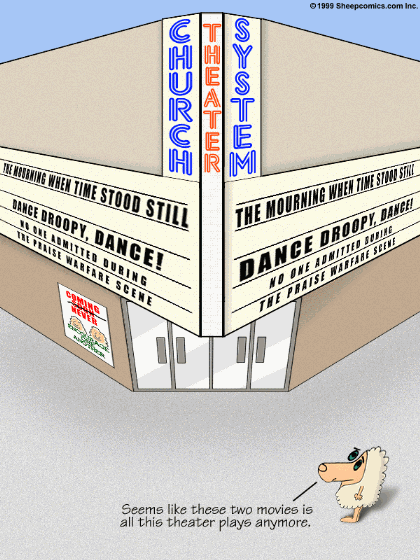 Single Panel Cartoon 2
Single Panel Cartoon 2
This is only a single panel cartoon. It shouldn't take more than a minute to load, but I thought I'd share some thoughts anyway.
I have recently spent a lot of time learning about what caused divisions in the Christian church during the first few hundred years after Christ. I�m not talking about the heresies, but rather the divisions which occurred between "orthodox" churches.
One of the first divisions concerned Christians who had been coerced into sacrificing to the "gods" during times of persecution. Could they return to the church or not? Some leaders said yes, and others said no. No agreement could be reached, so a division among churches resulted.
More recently (just four or five centuries ago) a lot of division occurred, and it came to be known as the "reformation". Two of the root issues were the nature of the Eucharist. Did the bread and wine really become Christ�s body and blood, or are the bread and wine symbolic only? Another issue was the Pope. Was it right or wrong to have all Christians report to a single human authority? I know I am oversimplifying, but please hear me out.
How about today? What causes division among Christians in our generation? What will future historians, centuries from now, think when they try to describe Christianity at the turn of the third millennium?
I don�t know, but when I think of differences between churches, the first thought that comes to mind is "worship style". A church, in our culture, is primarily defined by what happens during that all-important 90 minutes on Sunday morning.
In Matthew 11:16-17 (Luke 7:31-32) Jesus compares his contemporary generation with children who call out to each other in the marketplace. One group of children wants to play funeral, but the others won�t mourn. The other group has a festive flute player, but the first group doesn�t want to dance.
So, in my oversimplifying mind, I borrowed this metaphor to summarize the mainstream churches of today. I can divide them into two groups: the ones who want to spend Sunday morning playing funeral, and the ones who want to spend Sunday morning playing music and dancing.
Perhaps this comes from two different assumptions concerning what "normal life" is like, and what we need when we come together to worship.
Advocates of the "funeral" approach to worship assume that we are sinning all the time during the week, and probably having so much fun that we don�t even know we are sinning. What we need on Sunday morning is to sober up and feel bad, like a good Christian should. We atone for our sins committed during the week by enduring a forced "funeral" once a week on Sunday morning.
Advocates of the "dancing" approach to worship assume that our complicated lives and all the sin in the world are continually dragging us down. It�s all we can do to pry ourselves out of bed and drag ourselves to church on Sunday morning. What we need is a celebration! We need to sing and dance! This will recharge us so we can make it through the next week.
Now, these two approaches to worship seem very different, but underlying them are the same basic assumptions concerning what "worship" is. First, "worship" is an event that one attends. Second, the purpose of this event is mood alteration. There is something that goes wrong in our individual lives that needs to be "fixed" by a corporate performance. You have to addend this performance whether you need this mood change or not. A single church corporation can only produce one kind of performance, and the performance is not diminished one bit if you aren�t there.
To me, the whole church scene in America can be compared to all the various movie theaters competing for business in the "marketplace" of those seeking "religion". I can choose which one to attend, but the movie will be the same whether or not I�m there. I can pick a happy movie or a sad movie. I can go alone, be alone during the movie, and leave alone. I can expect everyone in the audience to leave me alone, since we are there for the show, not each other. My job is to sit and take in the show (and pay for it, of course).
The cartoon below shows Lionel the hapless lamb trying to choose which movie to go to. He has seen both of them many times. Unfortunately for Lionel, this theater is the only one in town, and it shows only two films.
The first movie "The Mourning when Time Stood Still" is a science fiction non-thriller about a person who lives free of charge in a large resort hotel full of amusements. There is only one condition however. Each week he must go to a certain room on Sunday morning where a funeral is in progress. At this funeral, the laws of space and time don�t apply. Even though it seems like 90 minutes to the outside world, any amount of time may elapse during the funeral. In this room, time may even stand still.
The second movie "Dance Droopy, Dance!" is a campy action/suspense movie about a person who lives alone and continually suffers from depression. This person is "rescued" and taken to a compound where he lives alone in a cell during the week, but every Sunday morning is forced to dance, sing, and celebrate with the other patients. The "doctors" are determined to cure him, no matter how much singing and dancing it takes. The climax of the movie is the "praise warfare scene" during which no one will be admitted.
Lionel once saw a poster about a movie called "Encourage One Another", and he keeps coming to the theater hoping to see this movie. Unfortunately, the theater owner has no plans to show it, and Lionel is disappointed once again.
See you at the movies.
